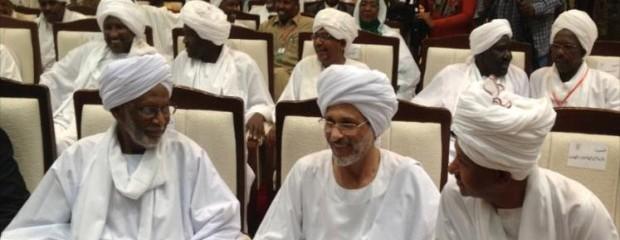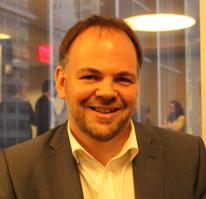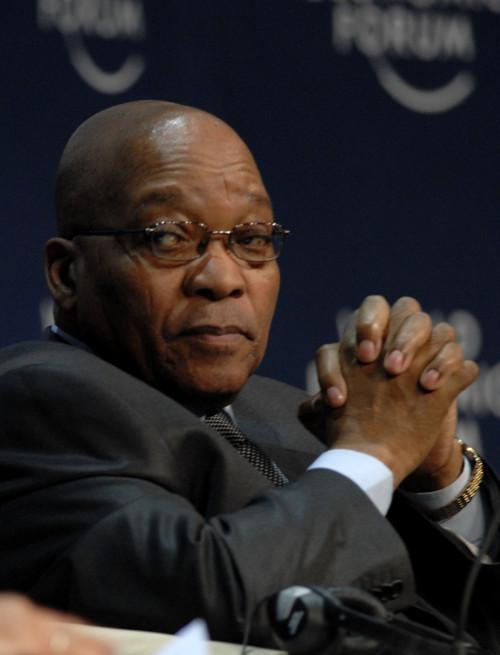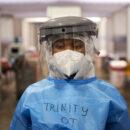Sudan: is the National Dialogue really dead? (And did it ever really exist anyway?) – By James Copnall

 “˜The National Dialogue is dead’. The verdict comes from Ghazi Salaheddin Atabani, one of the longest-serving Islamist intellectuals of the Bashir era, who defected to the opposition late last year. He, and several other opposition leaders, had previously extended a cautious welcome to President Omar al Bashir’s call, in January, for a national dialogue to examine the country’s many problems. What has changed?
“˜The National Dialogue is dead’. The verdict comes from Ghazi Salaheddin Atabani, one of the longest-serving Islamist intellectuals of the Bashir era, who defected to the opposition late last year. He, and several other opposition leaders, had previously extended a cautious welcome to President Omar al Bashir’s call, in January, for a national dialogue to examine the country’s many problems. What has changed?
It is difficult to dispute the fact that issues of identity, security, the economy and the country’s overall direction need to be addressed. Indeed, these questions have reoccurred frequently since even before Sudan’s independence in 1956. Nevertheless, other opposition leaders, and the rebels fighting the government in Blue Nile, South Kordofan and Darfur, had rejected the President’s appeal at the outset, believing it to be a way of dividing and diverting them rather than an attempt to engage them in a genuine reform project.
Dr. Ghazi came to see their point of view: his obituary notice for the National Dialogue was delivered earlier this month in light of the arrests of Sadig al Mahdi and the lesser known opposition politician Ibrahim al Sheikh, and also because of the continued restrictions on press freedom and opposition party activities. Although Sadig has now been released, it is difficult to see how the National Dialogue can be meaningfully resurrected.
For some, the real question is whether it was actually alive at any point. Outside the country, the National Dialogue did receive conditional backing from the African Union and other interested parties, presumably aware that it would not do to publicly undermine even a slim chance of a real Sudanese dialogue. Inside Sudan the pro-regime press has trumpeted its support. Dozens of parties signed up, even if most were offshoots of major parties or small groups with little popular support. Others sounded less impressed.
The Sudan Democracy First Group, no friends of the President, wondered whether it was ‘A National Dialogue, or a National (Congress Party) monologue?’ The Sudan Revolutionary Front, the rebel coalition, showed little interest in the talks, particularly when they were asked to lay down their arms as a precondition to joining. No rebel group is prepared to abandon its only form of leverage.
The former ruling elite (the Democratic Unionist Party and the National Umma Party) and the disaffected Islamists (the PCP and Ghazi’s Reform Now Party) were more open to Bashir’s overtures than the Communists and the armed opposition. Yet there were serious disagreements about the wisdom of such a move amongst even those who decided to participate. The differing reactions to the National Dialogue gnawed away at the frayed threads holding together the loose opposition grouping, the National Consensus Forces.
Hassan al Turabi’s ‘unconditional’ acceptance of the National Dialogue infuriated others in the alliance, and led to the suspension of his Popular Congress Party. Rebel leaders and some opposition politicians felt that these increased tensions within the opposition had been President Bashir’s intention all along.
The limited architecture thrown up by the National Dialogue has also revealed another potential flaw. The process has so far been designed for political parties, and – maybe – rebel groups, if the latter ever agree to take part. The committee set up has allocated seven seats to the NCP, and seven to members of opposition parties. Sudan Democracy First has bemoaned the ‘absence of any engagement of civil society and other social actors, including youth and women’s groups, professional associations, and traditional leaders””all of whom have close relationships to key constituencies and grassroots communities. In the government’s dialogue, there is clearly no space for these groups’.
The NCP’s Qutbi al Mahdi has said the Dialogue ‘will include civil society organizations, women’s groups, students, workers and craftsmen, and national personalities’, but so far this hasn’t happened. Five months after President Bashir’s speech, very little progress has been made, in the National Dialogue, towards any actual conversations; and Sadig’s arrest halted any forward momentum at all.
The veteran opposition leader, who was first Prime Minister in the 1960s, landed in jail after he criticised the alleged atrocities committed by the Rapid Support Forces, particularly in Darfur. The continuing fighting in Darfur, Southern Kordofan and Blue Nile underlines how much a real national conversation is needed – and how the conditions for one are not in place.
In a joint statement released on June 10, the US, Norway and the UK put the blame squarely on Khartoum: ‘the Government of Sudan has taken actions of late that have enabled some to raise doubts about the sincerity of this initiative [NB: the National Dialogue]. Most notably, the Government continues to wage a war and target civilians in Southern Kordofan and Blue Nile and bears primary responsibility for intensifying the conflict in Darfur, where some 300,000 have been displaced this year.’ Rebels are to blame, too, for the continued fighting. It is difficult to see how a real dialogue could be heard over the persistent rattle of AK47s.
Sadig’s arrest also highlighted the fact that the free political space a real National Dialogue would require is simply not present in Sudan. In April, President Bashir ordered the authorities to allow political parties to carry out their work and to permit greater press freedom. In practice, opposition parties find it impossible to hold public rallies, and press freedom is actually diminishing. Newspapers are often seized, and officials warn journalists about ‘red lines’ – including discussing the alleged crimes committed by the Rapid Support Forces.
There is not much prospect of the bulk of the opposition continuing with the National Dialogue unless the government takes several confidence-building measures. These would include removing restrictions on press and political freedoms, releasing political prisoners, and maybe even abrogating some of the clauses in the much-criticised Security law.
That all this is unlikely reveals one of the central tensions at the heart of the question. Restrictions on freedoms, and the powerful security service, are fundamental reasons why the NCP has stayed in power for so long. Removing them is not in the party’s interest. Neither is a true reshaping of the Sudanese state, in which the NCP would become one of the ingredients rather than the chef.
Many of the same national questions – and stumbling blocks – are part of the landscape in South Sudan too. The rapid descent of the country into civil war has prompted calls for its politicians to reassess their path, and indeed the very structure of the state. The debate over whether federalism is an appropriate model for the new country, as Riek Machar and many Eastern Equatorian politicians have suggested, is just one example of this.
In South Sudan, like in Sudan, real dialogue has yet to start; and despite promises, it is not yet clear whether the full range of South Sudanese society will make their voices heard in the deliberations over the country’s future.
In both Sudans, an opportunity may be provided by the current malaise. The NCP is only prepared to countenance a National Dialogue because it is weak, after the secession of the south and the resulting economic crisis, the fracturing of the Islamist movement, and the continued conflicts in its peripheries. In South Sudan, the six month old civil war has shown everybody that the trajectory after independence simply wasn’t tenable.
In both countries, the limited civil society has attempted to push for real change, one directed not by politicians or warlords but by the people themselves. So far this hasn’t worked, and it may not in the future. Yet it is clear that in both of the Sudans, real, wide-ranging, non-politicised conversations about the past, present and future are needed.
James Copnall is a journalist and author of “˜A Poisonous Thorn in Our Hearts: Sudan and South Sudan’s Bitter and Incomplete Divorce’






